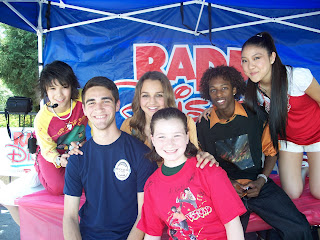This weekend our family is blessed with great translations:)
I completed my Medical translations course and am now a trained Medical Interpreter:)
and son #2 has made his Theater debut on Georgetown and below find his review:)
a year ago both these things were just a thought in both of our minds:)
today success in both:) imagine if we had just thought about it:)
go out and do it, don't just think about it,
Gods will be done in your life today:)
Theater
Nothing Lost in Nomad’s ‘Translations’
By Kaitlyn Edsall
Hoya Staff Writer
Friday, April 20, 2007
Tomorrow night marks an important milestone for Georgetown’s theater department.
At 8 p.m., the first student-directed, main stage production to be staged in the Davis Performing Arts Center will begin. Nomadic Theatre, also celebrating its 25th year on the Hilltop, will finish off this year’s three-play repertoire with performances of Translations in the Devine Theater.
Translations, a play by Brian Friel and directed by Jojo Ruf (COL ’08), is primarily about language barriers. Set in Ireland in 1833 as the British enter and attempt to instill the English tongue on the Gaelic-speaking isle, the play, which Ruf and producer Emily Howard (SFS ’07) have been working on for a year and a half, showcases Nomadic’s superior acting and addresses powerful ideas about identity, love and division with humor, sensitivity and grace.
The play opens gaily as a group of Irish students attend a hedge school, a school originally established in Ireland to illegally continue Catholic education. They converse joyfully and bawdily, in “Irish,” or Gaelic, Latin and Greek, reading Homer and enumerating the derivatives of verbs as they miscalculate their times tables — all, of course, with spot-on Irish brogues. But the ominous still hangs in the air, with whispers of potato famines and the British surveying their land.
And then the schoolmaster’s prodigal son, Owen (Alex Kostura, SFS ’09), returns with two British soldiers making a map of their land, and all things take a turn for the worst, especially when the young, idealistic orthographer Lt. George Yolland (played with likeable eagerness by Jamie Scott, COL ’10) falls for a local Irish lass with big dreams of far-off places, Maire (Cat Graves, COL ’08).
But of course, the conflicted Maire, played beautifully by Graves, is already engaged to Manus, the schoolmaster’s lame but admirable helper (played by an even more likeable Andrew Dolan, COL ’10). Thus the star-crossed, language-divided lovers flirt from afar, until one night at a dance they have a very Love Actually moment, speaking to each other the same words in different tongues, until they finally kiss and the world around them falls to pieces.
The jovial-turned-vastly-dark play is supported brilliantly by Kyle Fitzpatrick (COL ’08) as Doalty, a bumbling, mischievous and often hilarious Irish youth and his bonny blonde lass Bridget (Laura Stewart, COL ’09). As the alcohol-challenged, Latin-professing poet and schoolmaster Hugh, and his longtime, Athena-loving friend, Jimmy Jack, Jason Hibner (COL ’07) and Joshua DeMinter (COL ’09) are equally hilarious and devastating — seesawing between joyous and dilapidated. And Mike Mitchell (COL ’10) is appropriately stiff as the unforgiving Captain Lancey.
But perhaps the most gripping performance comes from the actress with the fewest lines. Giving a particularly heart-wrenching performance, and almost stealing the show from its leading lady, Rachel Caywood (COL ’10) plays the mute Sarah, who is just learning to speak her own name from Manus as the play opens. She’s completely expressive, even without words. Perhaps it is ironic that in a play about language, the most captivating character is the one who hardly speaks at all.
But that is the sadness of the play: the language and the culture that the intruding British evict. They are stealing not just their curly-haired girls, but their identity and voice.
As the astute young George points out, by replacing the names of the Irish lakes, roads and villages, “something is being eroded.” A great, multilingual society is being forced to speak simply English. And perhaps the saddest part of all is that Translations is spoken entirely in English, not Gaelic. For who would understand it?
Back to Top












